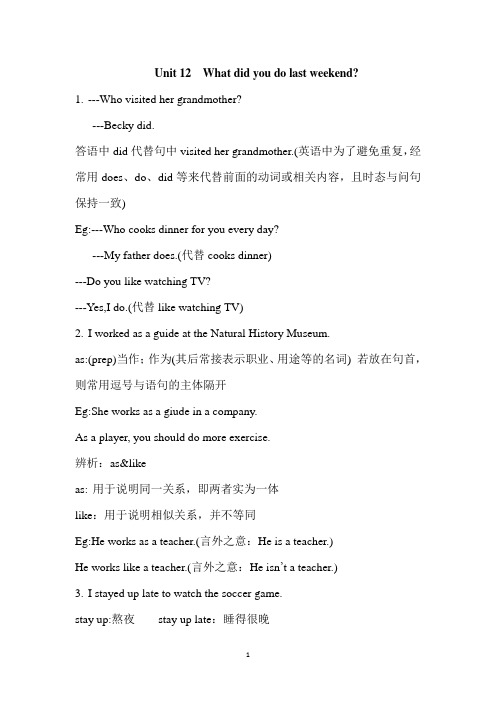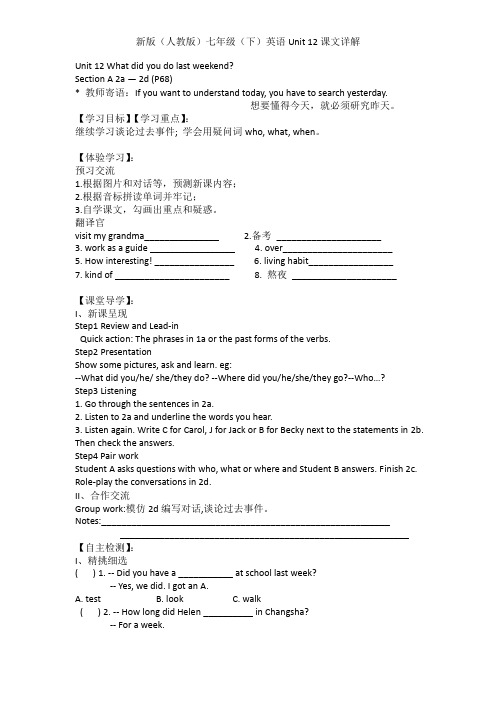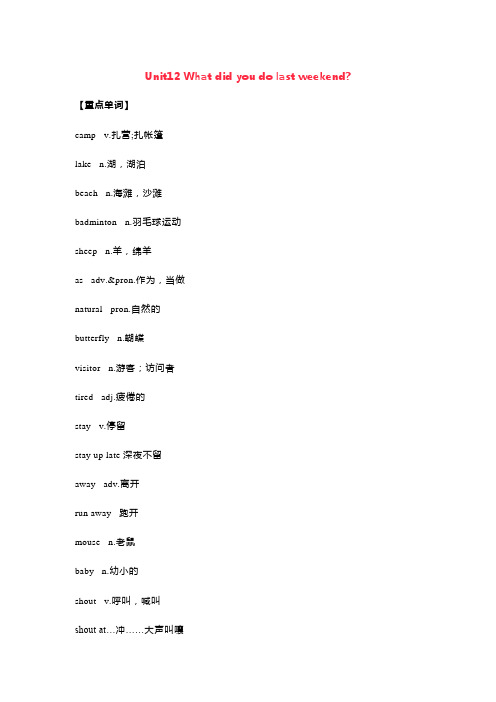七年级英语下册unit12
- 格式:pptx
- 大小:93.36 KB
- 文档页数:10

Unit 12 What did you do last weekend?1.---Who visited her grandmother?---Becky did.答语中did代替句中visited her grandmother.(英语中为了避免重复,经常用does、do、did等来代替前面的动词或相关内容,且时态与问句保持一致)Eg:---Who cooks dinner for you every day?---My father does.(代替cooks dinner)---Do you like watching TV?---Yes,I do.(代替like watching TV)2.I worked as a guide at the Natural History Museum.as:(prep)当作;作为(其后常接表示职业、用途等的名词) 若放在句首,则常用逗号与语句的主体隔开Eg:She works as a giude in a company.As a player, you should do more exercise.辨析:as&likeas: 用于说明同一关系,即两者实为一体like:用于说明相似关系,并不等同Eg:He works as a teacher.(言外之意:He is a teacher.)He works like a teacher.(言外之意:He isn’t a teacher.)3.I stayed up late to watch the soccer game.stay up:熬夜stay up late:睡得很晚与stay相关的常见短语:stay at home待在家里stay away from远离stay healthy保持健康stay out 待在外面与up相关的短语call up 打电话catch up with 赶上come up with提出get up 起床give up放弃grow up 成长look up 向上看;查出make up编造;构成pick up 捡起;中途载人put up 举起;张贴set up 创建show up出现take up 占据turn up调大use up用完;耗尽4.Father mouse shouted at the cat, “Woof,woof.”辨析:shout at &shout toShout at:冲...大声叫喊(多指因生气/愤怒冲某人叫喊)Eg: He loses his temper and shouts at me.shout to:对...大声叫喊(无恶意,多因距离远)Eg: : “Can you hear me?”he shouts to Tom.5.“Well,son,that’s why it’s important to learn a second language.”(1)that’s why...这就是...的原因why引导的名词性从句在句中作表语Eg:That’s why I can pass the important exam,because I study hard. that’s because...那是因为...(表示原因)Eg:He didn’t go to school trip. That’s because he was badly ill.6.flew a kite 放风筝flew为fly的过去式fly的用法:(vi)(1)fly to乘/坐飞机=go (to)...by plane/airEg:She will fly to New York. She will go to New York by plane/air.(2)飞Eg:He hopes he can fly like a bird.(3)飞逝Eg:How time flies! (时光飞逝)(4)苍蝇Eg:Look! A fly is swimming in the porridge.7.There we put up our tents and made a fire to keep us warm and cook food on.(1)put up:搭建;张贴(动副结构)(2)keep的用法Keep sb./sth.+adj 让某人/某物保持...(强调某种状态)Eg:The coat will keep you warm.The students should keep the classroom clean.Keep sb./sth.+doing 让某人/某物一直...(强调动作的持续性)Eg:I’m sorry I’ve kept you waiting.8.The next morning,my sister and I got a terrible surprise.get a surprise 吃惊(可数名词)surprise:(不可数名词)in surprise惊奇地;惊讶地To one’s surprise 令某人惊讶的是(vt)使吃惊;使惊奇(adj)surprising surprisedEg:Her idea surprises me.9.I was so scared that I couldn’t move.(1)so...that...如此...以致于... (so后接adj/adv)Eg:The box is so heavy that I can’t carry it.He runs so fast that I can’t catch up with him.拓展:such+a/an+adj+单数可数名词+that...相当于so+adj+a/an +单数可数名词+that...Eg:Mr. Yi is such a kind teacher that we all like him. Mr. Yi is so kind a teacher that we all like him.(2)scared:惊慌的;吓坏了的=afraidbe scared of sth. 害怕做某事be scared to do sth.害怕做某事Eg:Miss Zhang is scared/afraid of the ghost.The little boy is scared/afraid to read in fornt of the others.10.感叹句(what/how )。

Unit 12 What did you do last weekend?Section A 2a — 2d (P68)* 教师寄语:If you want to understand today, you have to search yesterday.想要懂得今天,就必须研究昨天。
【学习目标】【学习重点】:继续学习谈论过去事件; 学会用疑问词who, what, when。
【体验学习】:预习交流1.根据图片和对话等,预测新课内容;2.根据音标拼读单词并牢记;3.自学课文,勾画出重点和疑惑。
翻译官visit my grandma_______________ 2.备考_____________________3. work as a guide _________________4. over______________________5. How interesting! ________________6. living habit_________________7. kind of _______________________ 8. 熬夜_____________________【课堂导学】:I、新课呈现Step1 Review and Lead-inQuick action: The phrases in 1a or the past forms of the verbs.Step2 PresentationShow some pictures, ask and learn. eg:--What did you/he/ she/they do? --Where did you/he/she/they go?--Who…?Step3 Listening1. Go through the sentences in 2a.2. Listen to 2a and underline the words you hear.3. Listen again. Write C for Carol, J for Jack or B for Becky next to the statements in 2b. Then check the answers.Step4 Pair workStudent A asks questions with who, what or where and Student B answers. Finish 2c. Role-play the conversations in 2d.II、合作交流Group work:模仿2d编写对话,谈论过去事件。

七年级下册英语Unit 1 Can you play the guitar ?1、c an+动词原形,它不随主语和数而变化。
(1)含有can的肯定句:主语+can+谓语动词的原形+其他。
⑵变一般疑问句时,把can提前:Can+主语+动词原形+其他?肯定回答:Yes,主语+can。
否定回答:No,主语+can't.⑶含有can的否定句:主语+can't+动词的原形+其他。
(4)含有can的特殊疑问句:特殊疑问词+can+主语+动词原形+其他?2、may+动词的原形。
(may为情态动词)一般疑问句是把may提前,肯定回答是:Yes,主语+may。
否定回答是:No,主语+mustn't。
或please don'。
join+某个组织,俱乐部,party,参军,党派等加入”Join sb. 参加到某人中” join in (doing)sth 加入做“... ,参加某个活动” Joi n in二 take part in + 活动,比赛3、说某种语言:speak+语言4、play+球、棋、牌;play+the+乐器。
5、擅长于(做)什么:be good at +名词/动ing6、帮助某人做某事:help sb. (to ) do sth. help sb. with sth.7、我能知道你名字吗?May I know your name?& 想要做什么:want to do sth 例如:I want to learn about art.9、W hat club do you want to join?I want to join the chess club and the basketball club.10、What club does Tom want to join? He wants to join the swimming club .11、He can't play the violin or the piano. Can you help kids with swimming?12、Why do you want to join the English club? Because I want to learn English well.Unit 2 What time do you go to school ?1、what time和when引导的特殊疑问句。

最新人教版七年级英语下册单元知识归纳Unit12Unit 12 What did you do last weekend?重点清单1.do one's homework 做家庭作业2.go to the cinema 去看电影3.go boating 去划船4.camp by the lake 在湖边露营5.go to the beach 去海边6.play badminton 打羽毛球7.living habits 生活习惯8.have a good weekend 度一个好周末9.stay up 熬夜10.two weeks ago 两个星期前11.go camping 去露营12.put up 穿(戴)上13 make a fire 生火14.each other 相互15.get a surprise 吃惊16.look out of 朝外看17.shout to ... 对 ... 大喊18.start to do sth. 开始做某事19.up and down 到处20.wake ... up 叫醒 .......21.1stayed up late to watch the soccer game・我熬夜看足球比赛。
22.1worked as a guide at the Natural History Museum.我在自然历史博物馆当导游。
23.They have a butterfly house with over 200kinds of butterflies.他们有一个蝴蝶屋,里面有200多种蝴蝶。
24.There we put up our tents and made a fire to keep us warm and cook food on.在那我们支起一个帐篷,并生火取暖,在火上烹饪食物。
25.1was so tired that I went to sleep early.我太累了,因此很早就去睡觉了。

Unit12 What did you do last weekend?【重点单词】camp v.扎营;扎帐篷lake n.湖,湖泊beach n.海滩,沙滩badminton n.羽毛球运动sheep n.羊,绵羊as adv.&pron.作为,当做natural pron.自然的butterfly n.蝴蝶visitor n.游客;访问者tired adj.疲倦的stay v.停留stay up late深夜不留away adv.离开run away 跑开mouse n.老鼠baby n.幼小的shout v.呼叫,喊叫shout at…冲……大声叫嚷woof v.(狗叫声)汪汪language n.语言fiy v.飞kite n.风筝fiy a kite 放风筝high adj.&adv高的(地)high school中学ago adv.以前India n.印度tent n.帐篷put up 搭起,举起moon n.月亮surprise n.&v.惊奇,惊讶get a surpris 吃惊snake n.蛇scared adj.惊慌的move v.移动shout to… 对……大声喊叫start v.开始,着手jump v.跳跃up and down 上上下下wake v.弄醒,醒into prep.到……里面forest n.森林ear n.耳朵【重点短语】1. last weekend 上周末2. do one’s homework 做作业3. go to the cinema 看电影4. go boating 去划船5. camp by the lake 在湖边露营6. go to the beach 去海滩7. play badminton 打羽毛球8. on Saturday morning 在周六的早上9. study for the English test 为了英语考试学习10. feed some cows 喂一些奶牛11. work as a guide 做为一个导游工作12. Natural History Museum 自然历史博物馆13. butterfly house 蝴蝶馆14. over 200 kinds of butterflies 超过200多种蝴蝶15. tell sb about … 告诉某人关于…16. living habits 生活习惯17. be kind of tired 有点儿累19. stay up 熬夜20. play with sb. 和某人玩21. lose things 丢东西22. run away 跑开23. fly a kite 放风筝24.as a special gift 作为一个特殊的礼物25. take sb. to sp. 把某人带到某地26. go camping 去露营27. put up the tents 搭建帐篷28. make a fire 生火29. keep sb. warm 使某人保持温暖30. on the first night 在第一天晚上31.so...that... 如此…以至于…32. go to sleep 去睡觉33. get a surprise 吃惊34. see sb. doing sth. 看见某人正在做某事35. jump up and down 上蹦下跳36. climb onto one’s back 爬到某人背上37. shout at/shout to 大声喊叫38 wake …up 把...弄醒39. move into… 移入,爬进…中40. a useful lesson 有用的一课【重点句型】1.—What did you do last weekend?Lucy?Lucy,你上周末做了什么?—Well, on Saturday, I played badminton.噢.周六我打羽毛球了。

Unit 12 What did you do last weekend?Section A, 1bBob: Hey, Lucy.你好,露西。
Lucy: Hi, Bob.你好,鲍勃。
Bob: How was your weekend?周末过得怎么样?Lucy: It was great.很好。
Bob: So, what did you do?那你都做什么了?Lucy: Well, on Saturday morning, I played badminton. In the afternoon, I went to the beach, and at night, I went to the cinema.周六上午我打了羽毛球,下午我去了沙滩,晚上去看了电影。
Bob: Cool. What about Sunday?不错。
周日呢?Lucy: In the morning, I camped by the lake with my classmates. In the afternoon, we went boating, and at night, I did my homework.上午我和同学在湖边露营。
下午,我们去划船,然后晚上我做了作业。
Section A, 2a, 2bTeacher: So, did everyone have a good weekend?大家周末过得好吗?Students: Yeah, we did, Ms. Clark!是的,很好,克拉克女士!Teacher: Good. What did you do last weekend, Becky?很好。
贝姬,上周末你做什么了?Becky: I visited my grandma, and I did my homework.我去看我祖母,然后做了作业。
Teacher: Great. And how about you, Carol?不错。
Unit 12 What did you do last weekend?Grammar Focus-3cTeaching and learninggoals:一、语言知识:1. Learn to use the following new words and phrases:run away, mice, mouse, baby, shout at, woof, language2. Learn to use the following sentences:What did you do last weekend?I did my homework./ We went shopping.Who visited her grandma? Becky did.Where did she go last weekend? She went to a farm.Who did she go with? She went with her classmates.二、语言功能:Learn to describe the past events using the sentence structures: What did…? Where did/ was/ were…? Who did/ was/ were…?三、学习策略:1. 能正确使用一般过去时态的各种句式来描述过去发生的事情。
2. 能灵活分辨动词过去式的规则变化和不规则变化。
四、情感态度:1. 了解掌握一门外语的重要性。
2. 让学生合理安排上学日和周末的时间,丰富课外活动,劳逸结合,享受美好生活。
【设计意图】目标引领,从四个方面表述了本节语法课的语言知识、语言功能、学习策略和情感目标。
尤其突出了对所学语法在实际生活中的运用能力的培养, 使本节课更具针对性和高效性,更贴近生活并服务于生活。
Teaching and learning steps:Step1. PreviewI.短语连线。
人教版新目标七年级英语下册 Unit 12教学设计一. 教材分析人教版新目标七年级英语下册Unit 12主要介绍了日常生活中的交通规则和安全知识。
通过本单元的学习,学生能够掌握有关交通规则的词汇和表达方式,学会如何询问和描述交通状况,并在实际生活中遵守交通规则,提高安全意识。
本单元包括两个任务,分别为Task 1:询问和描述交通状况;Task 2:讨论如何遵守交通规则。
二. 学情分析七年级的学生已经掌握了基本的英语语法和词汇,具备一定的听说读写能力。
但部分学生对交通规则和安全知识的了解不够深入,需要在教学中进行引导和拓展。
此外,学生们的学习兴趣和积极性较高,对新鲜事物充满好奇心,适合采用情境教学法和互动教学法,提高他们的学习效果。
三. 教学目标1.知识目标:学生能够掌握有关交通规则的词汇和表达方式,如crossthe road、traffic lights、safe等;2.能力目标:学生能够运用所学的词汇和句型询问和描述交通状况,提高日常生活中遵守交通规则的意识;3.情感目标:培养学生关爱生命,遵守交通规则的良好习惯。
四. 教学重难点1.重点:掌握有关交通规则的词汇和表达方式;2.难点:如何运用所学的词汇和句型询问和描述交通状况,以及如何在实际生活中遵守交通规则。
五. 教学方法1.情境教学法:通过设置真实的生活情境,让学生在实际语境中学习和运用英语;2.互动教学法:引导学生参与课堂互动,提高他们的听说读写能力;3.任务型教学法:以完成实际任务为目标,培养学生运用英语解决问题的能力。
六. 教学准备1.教学课件:制作包含图片、动画和视频的课件,帮助学生直观地了解交通规则;2.教学道具:准备一些交通标志和模型的实物或图片,用于课堂展示和练习;3.练习题:设计一些有关交通规则的练习题,用于巩固所学知识。
七. 教学过程1.导入(5分钟)利用课件展示一些交通场景,如红绿灯、行人过马路等,引导学生谈论交通规则。